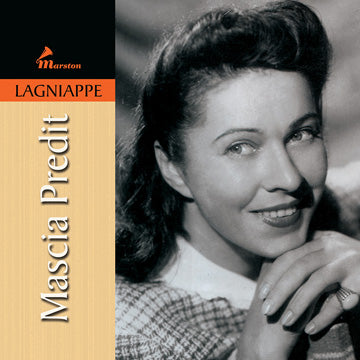Mascia Predit



72:08 |
||
Cetra, Milan: 9 October 1945 |
||
Six songs for soprano and orchestra (Mussorgsky, arranged and orchestrated by Igor Markevich) |
||
| 1. | Kolybel’naja pesnja (Peasant’s lullaby) | 4:46 |
| (2.70955-C.T.) 25146 | ||
| 2. | Strekotunja-beloboka (The magpie) | 3:04 |
| (2.70957II-C.T.) 25146 | ||
| 3. | Gde ty, zvezdochka? (Where are you, little star?) | 4:41 |
| (2.7095611-C.T.) 25147 | ||
| 4. | Noch (Night) | 4:15 |
| (2.70956II-C.T.) 25147 | ||
| 5. | Ozornik (The ragamuffin) | 2:04 |
| (2.70960-C.T.) 25148 | ||
| 6. | Na Dnepre (On the Dnieper) | 4:34 |
| (2.70959-C.T.) 25148 | ||
Cetra, Milan: 24 February 1946 |
||
| 7. | Pesni Czy’ganki (Song of the gypsy girl) Op. 60, No. 7 (Tchaikowsky) | 3:25 |
| (2.70973-C.T.) BB 25153 | ||
| 8. | Kolybelnaya (Lullaby) Op. 16, No. 1 (Tchaikowsky) | 4:01 |
| (2.70974-C.T.) BB 25153 | ||
| 9. | Net, tolka tot, kto znal (None but the lonely heart) Op. 6, No. 6 (Tchaikowsky) | 2:58 |
| (2.70975-C.T.) BB25154 | ||
| 10. | To byla ranneju vesnoj (It was in early spring) Op. 38, No. 2 (Tchaikowsky) | 2:53 |
| (2.70976-C.T.) BB 25154 | ||
Cetra, Milan: 16 July 1949 |
||
| 11. | Z˙yczenie (The maiden’s wish) (Chopin) | 1:46 |
| (53851) AT 0153 | ||
| 12. | Piosnka Litewska (Lithuanian song) (Chopin) | 2:57 |
| (53852) AT 0153 | ||
La Voce del Padrone, Milan: Ca. 1942 |
||
| 13. | Il clearco in Negroponte - Aria di Aldrasto (Scarlatti) | 3:25 |
| (0BA 5280) DA5436 | ||
| 14. | Verborgenheit (Wolf) | 3:03 |
| (0BA 5281) DA5436 | ||
His Master’s Voice, London: |
||
| 15. | To byla ranneju vesnoj (It was in early spring) Op. 38, No. 2 (Tchaikowsky) | 2:43 |
| 17 January 1949 (0EA 13540-1) unpublished | ||
| 16. | Sret shumnava bala (At the ball), Op. 38, No. 3 (Tchaikowsky) | 1:57 |
| 24 November 1949 (0EA 14309-1) DA1941 | ||
| 17. | Pesni Czy’ganki (Song of the gypsy girl), Op. 60, No. 7 (Tchaikowsky) | 3:29 |
| 24 November 1949 (0EA 14311) DA1941 | ||
| 18. | Dlya beregov otchizny dalnoj (For the shores of thy homeland) (Borodin) | 4:03 |
| 24 November 1949 (2EA 14308-1B) unpublished | ||
| 19. | Gde ty, zvezdochka? (Where are you, little star?) (Mussorgsky) | 3:52 |
| 24 November 1949 (2EA 14310) DB21144 | ||
| 20. | Noch (Night) (Mussorgsky) | 3:42 |
| 28 November 1949 (2EA 14329) DB21144 | ||
| 21. | Na Dnepre (On the Dnieper) (Mussorgsky) | 4:32 |
| 28 November 1949 (2EA 14328-1) unpublished | ||
|
Accompaniment: With orchestra conducted by Igor Markevich [1-6]; with Giorgio Favaretto, pianist [7-14]; with Gerald Moore, pianist [15-21] Languages: Russian [Tracks 1-10, 15-21]; Polish [11 and 12]; Italian [13]; German [14] |
||
Mascia Predit was born in Latvia 21 December 1906. She worked with great conductors, Igor Markevitch and Sir Adrian Boult; outstanding accompanists, Gerald Moore and Giorgio Favaretto; and the great film director, Luchino Visconti. It was Predit’s appearance in his 1971 film Death in Venice that brought her international fame.
Predit began her career as an actress, training with two students of Stanislavsky. At the prodding of friends, she began to take singing lessons with Latvian tenor Evgeni Vitting. In a private memoir, Predit stated that Feodor Chaliapin and Albert Coates heard her at Vitting’s studio and encouraged her to travel to Italy for further vocal instruction. Instead, she studied in Switzerland with Salvatore Salvati who gave her the foundation of her technique.
Predit made her first concert appearance in 1939 at the House of the Blackheads in Riga accompanied by Ivan Sukhov. Further work with Rosina Storchio in Italy led to her first concert in Milan with pianist, Giorgio Favaretto, who also accompanied her on her first records. Her operatic appearances were few, but included Ilia in Idomeneo and Ellen Orford in the first Italian production of Peter Grimes. Concert appearances were more frequent, including the premiere of six Mussorgsky songs, which Igor Markevitch arranged for orchestra and dedicated to her.
Returning to Yugoslavia in the middle 1950s her professional singing career came to an abrupt halt. Trapped behind the Iron Curtain, she was unable to leave until 1970. Upon her return to the West, her friend Luchino Visconti, who knew her since the early 1950s, learned that she was destitute and asked her to appear in the final scene of his now famous 1971 film, A Death in Venice. Unplanned and unscripted, Visconti told her to “sing something appropriate” to lull Aschenbach to his final sleep in the last scene of the film. She chose a Mussorgsky lullaby and sang it a cappella; her character was that of an elegant woman sitting in a beach chair surrounded by her family. It is a haunting and powerful scene. Predit’s few minutes in the film likely helped secure her a teaching position at Catholic University in Washington D.C., where she remained for twenty years. After retirement, Predit moved to Wilmington, Delaware where she continued teaching privately.
In the late 1990s Predit moved to a nursing home in Baltimore where she died on 7 October 2001, at the age of ninety-four.
Predit recorded for Cetra, La Voce del Padrone, and HMV. Two unpublished HMV discs, Borodin’s “For the shores of thy homeland” and “To the Dnieper” are transferred from Predit’s own test pressings. A third unpublished HMV recording, “It was in early spring” by Tchaikovsky, was kindly supplied by Alan Bilgora. All three test pressings appear here for the first time.